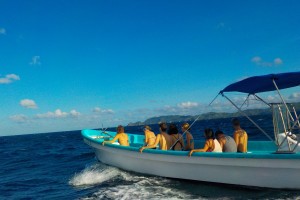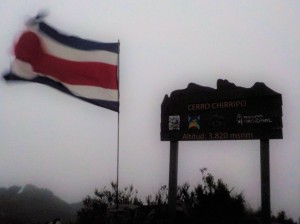In the United States, our connection to the Internet is not even dependent on the actual Internet connection. No Wifi? That’s what data is for, right? Before I studied abroad, I was guilty of taking advantage of my free data (or, if I went over, my fairly cheap data). Of course, I was most appreciative of my campus’s free Wifi that provided me with a steady stream of Instagram, Twitter, Facebook, and email updates all day long. I didn’t consider myself completely dependent on Wifi, but when you have access to it every day, it’s hard not to take it for granted.
 |
| Boat rides to snorkel locations for marine biology class are NOT phone-friendly places. Leave the technology at home (except for maybe a waterproof camera!). |
So one of my biggest concerns before studying abroad in Costa Rica was, 'will I have Wi-Fi?' I didn’t just want access to my social media accounts (although that was very important, since I was a CEA Mobile Journalist, after all). I also wanted to:
- Keep a personal blog (so my family would have regular updates, and so I could look back one day and remember my experiences abroad)
Stay updated on my email (I get a LOT of emails for my personal account, as well as my school account) - Use Skype (I would have to conduct one or two advisor meetings with my home university)
- Message friends (Many people’s cellphone-use plans abroad don’t include texting or calling, so messaging within wifi boundaries was our main form of communication)
- Research travel destinations (I wanted to travel every weekend, and I know the Internet would have the most updated information on bus schedules, ticket prices, events, etc.)
Growing up with the Internet, I’ve begun to feel like I’m living two lives: one online and one offline. I feared I wouldn’t be able to maintain my online-self sufficiently while studying abroad. However, I was also very excited to work on my presence in the here and now if I was put in a situation with little to no internet.
So how did this balance of life online and offline go for me?
First of all, Costa Rica had no shortage of free Wifi. A majority of restaurants, hotels, and businesses offered it. In the most tourist-heavy parts of the country (Tamarindo, Manuel Antonio, Jaco, and basically any other locations along the coast), the Internet was especially easy to connect to. And, most importantly, Universidad Veritas (where I went to school every day) offered students a wonderful Internet connection as well as five or six computer labs to use! The computer labs were outfitted with Apple and Windows computers which had many design programs like Adobe Photoshop, Premiere, Illustrator, and more (since Veritas is a private university with a concentration on architecture, art and design, film, and photography).
 |
| Despite the thin air and its close proximity to space satellites, even at the top of Cerro Chirripó (the highest point of Costa Rica) I couldn't connect to the Internet |
The CEA Study Abroad office (where we could study and hang out) as well as all of the CEA homestays were also equipped with Wifi (however, the connection in our house was not always reliable). In general, it was easy to get connected to the Internet whenever necessary, but it became unnecessary to permanently stay connected. My outrageously-priced data was one factor (I was not going to pay $0.25 per MB once I went over 1 GB of data), but I also became more interested in what I could explore and do offline. In the US, I spent the most time online over the weekend. In contrast, I traveled around the country every weekend in Costa Rica!
Being constantly on-the-move freed me from getting bored and jumping online like I did in the US. Instead, I concentrated on taking photographs and videos or even just exploring. I reawakened my creativity and discovered a deeper love for documentary photography and videography, which turned out to be a very important step in my career. As a film student, my first year of college was a little overwhelming, because I was learning so much that I never knew went into making movies. I wasn’t sure that I could do that for the rest of my life. However, by taking a break from typical film classes, I reconnected with my camera and with the world that it helps me see as well.
I ended up only using the Internet when necessary while abroad. I was sure to post daily Instagram photos (not only to update friends but also to encourage others to travel and study abroad to Costa Rica to see and experience its beauty!), I Skyped my advisers to tell them how my semester was going, I messaged friends who asked how I was doing, and I added a blog post nearly every night. And one of my favorite things to do with my Wifi was going online to research what I could do and see in Costa Rica next weekend in order to go offline.
Gabriella Cisneros is a CEA Alumni Ambassador. She is a student at the University of Wisconsin-Milwaukee where she is studying film and Spanish. She studied abroad with CEA in San José, Costa Rica in the fall of 2015.







